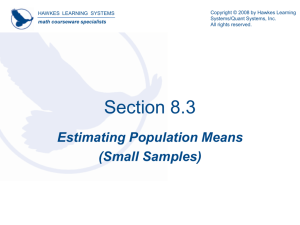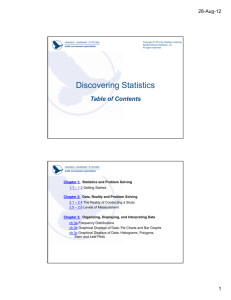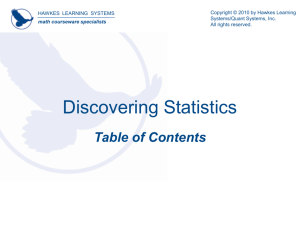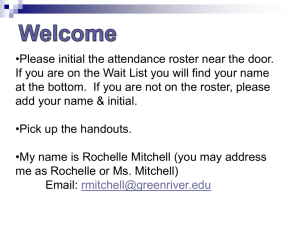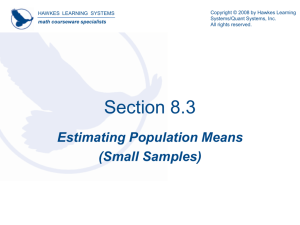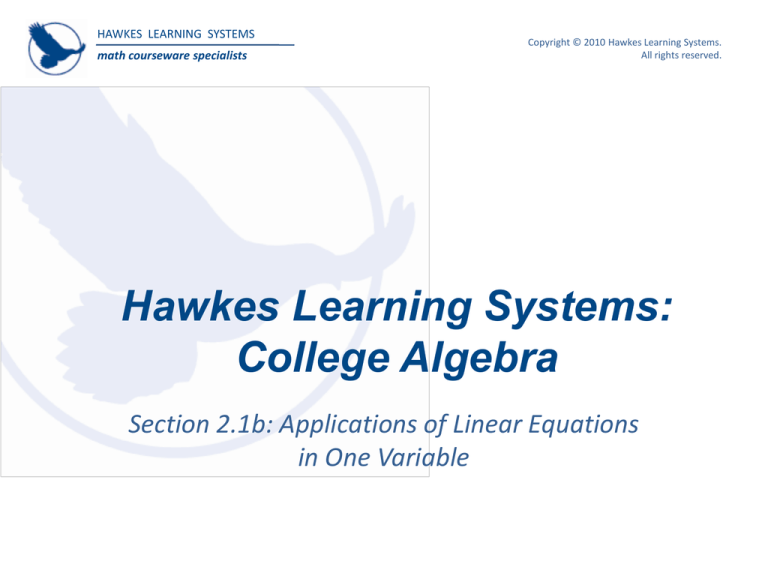
HAWKES LEARNING SYSTEMS
math courseware specialists
Copyright © 2010 Hawkes Learning Systems.
All rights reserved.
Hawkes Learning Systems:
College Algebra
Section 2.1b: Applications of Linear Equations
in One Variable
HAWKES LEARNING SYSTEMS
Copyright © 2010 Hawkes Learning Systems.
All rights reserved.
math courseware specialists
Objectives
o Solving linear equations for one variable.
o Interlude: distance and interest problems.
HAWKES LEARNING SYSTEMS
Copyright © 2010 Hawkes Learning Systems.
All rights reserved.
math courseware specialists
Review
In Section 2.1a, we learned that:
o An equation is a statement that two expressions are equal
o There are three types of equations:
• An Identity is an equation that is true for all real
numbers.
• A Contradiction is an equation that is never true.
• A Conditional equation is an equation that is true for
some values of the variable(s) and false for others.
o The solution set is the set of values by which the variable(s)
can be replaced to make the equation true.
o Two equations that have the same solution set are called
equivalent equations.
HAWKES LEARNING SYSTEMS
math courseware specialists
Copyright © 2010 Hawkes Learning Systems.
All rights reserved.
Solving Linear Equations for One Variable
o One common task in applied mathematics is to solve
a given equation in two or more variables for one of
the variables.
o Solving for a variable means to transform the
equation into an equivalent one in which the
specified variable is isolated on one side.
o This is accomplished by the same methods we used
to solve equations in Section 2.1a.
HAWKES LEARNING SYSTEMS
Copyright © 2010 Hawkes Learning Systems.
All rights reserved.
math courseware specialists
Example 1: Solving Linear Equations
for One Variable
Solve the following equations for the specified variable.
P 2l 2w. Solve for w.
P 2l 2 w
P 2l 2 w
P 2l
w
2
P 2l
w
2
Step 1: add (2l ) to both sides of
the equation.
Step 2: divide by 2 on both sides
of the equation.
HAWKES LEARNING SYSTEMS
Copyright © 2010 Hawkes Learning Systems.
All rights reserved.
math courseware specialists
Example 2: Solving Linear Equations
for One Variable
mt
r
A P 1 . Solve for P.
m
r
A P 1
m
A
r
1
m
mt
mt
P
r
P A 1
m
mt
HAWKES LEARNING SYSTEMS
Copyright © 2010 Hawkes Learning Systems.
All rights reserved.
math courseware specialists
Example 3: Solving Linear Equations
for One Variable
S 2 r 2 2 rh. Solve for h .
S 2 r 2 2 rh
S 2 r 2 rh
2
S 2 r 2
h
2 r
S 2 r 2
h
2 r
HAWKES LEARNING SYSTEMS
math courseware specialists
Copyright © 2010 Hawkes Learning Systems.
All rights reserved.
Interlude: Distance and Interest Problems
Good examples of linear equations arise from
certain distance and simple interest problems.
The basic distance formula is d rt where d is
distance traveled at r rate for time t .
The simple interest formula is I Prt where I is
the interest earned on principal P invested at
rate r for time t .
HAWKES LEARNING SYSTEMS
Copyright © 2010 Hawkes Learning Systems.
All rights reserved.
math courseware specialists
Example 4: Distance Problems
A riverboat travels downstream at an average speed of 20 miles
per hour. How long will it take for the boat to travel 110 miles?
d rt
d 110 miles
r 20 miles per hour
Application of the distance equation.
Given.
110 20t
110
t
20
t 5.5 hours, or 5 hours and 30
minutes
HAWKES LEARNING SYSTEMS
math courseware specialists
Copyright © 2010 Hawkes Learning Systems.
All rights reserved.
Example 5: Distance Problems
Two trucks leave a warehouse at the same time. One travels due
west at an average speed of 61 miles per hour, and the other
travels due east at an average speed of 53 miles per hour. After
how many hours will the two trucks be 456 miles apart?
d1 d 2 456
Given.
r1 61
r2 53
d1 d 2 rt
1 1 r2t2
456 61t 53t
Plug values in.
456 114t
Combine like terms, and solve.
t 4 hours
HAWKES LEARNING SYSTEMS
math courseware specialists
Copyright © 2010 Hawkes Learning Systems.
All rights reserved.
Example 6: Interest Problems
Sarah invested $10,000 in a global technology mutual fund on
January 1st. On July 1st, her stock is worth $11,400. What
effective annual rate of return has she earned so far?
I Prt
Application of the interest equation.
Given.
P 10,000 and t 0.50
I 11,400 10,000 1400
1400 (10,000)r (0.50)
1400 5000r
1400
r
5000
r 0.28, or 28%


